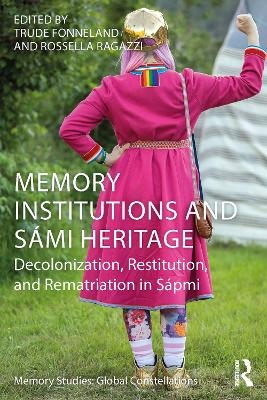
Memory Institutions and Sámi Heritage
Routledge (Verlag)
978-1-032-54719-0 (ISBN)
- Lieferbar (Termin unbekannt)
- Versandkostenfrei
- Auch auf Rechnung
- Artikel merken
The destruction and concealment of Sámi objects in both private and museum collections worldwide have impacted Sámi knowledge systems, disrupting local ways of knowing. Appreciation and reappropriation are important acts of decolonization which seek to create openings for reconnection to traditions, languages, and practices that were forcibly suppressed in the past. Western memory institutions such as museums, archives, and galleries have had a great impact on how heritage has been collected, stored, conserved, and organized within closed walls and glass cases. As the new museology movement developed in the 1990s, numerous examples revealed how difficult it became for researchers and public alike to access heritage. Considering the proliferation of cultural interventions and the growth of Sámi mobilization, which calls into question assumptions about how best to activate and experience Sámi cultural heritage and what constitutes appropriate stewardship, this book sheds light on initiatives to return artefacts to the Sámi community. With particular attention to the ways in which Sámi self-determination and the shifting boundaries between Indigenous and settler identities are articulated, challenged, and renegotiated, it draws on approaches from critical museology and Indigenous methodologies to explore the initiation, experience, and operationalizing of restitution projects.
This book will therefore appeal to scholars of cultural studies, anthropology, sociology, and museum and heritage studies, as well as to those interested in questions of repatriation, restitution, and healing processes.
Trude Fonneland is a professor of cultural studies at UiT The Arctic University Museum of Norway. Her research interests include Sámi cultural heritage, museology, and contemporary shamanism. She is co-author of Sámi Religion: Religious Identities, Practices, and Dynamics (2020) and Shamanic Materialities in Nordic Climates (2023). Rossella Ragazzi is an associate professor of museum and media anthropology at UiT The Arctic University Museum of Norway. Her current research interests explore critial theories of heritage within Sámi museums. She is the author of Walking on Uneven Paths: The Transcultural Experience of Children entering Europe in the Years 2000 (2009) and has co-edited two volumes of Nordic Museologi, focusing on Sámi Museums heritage and museums.
Introduction 1. Máhttsat ja Mujttalit: Árran’s Negotiations in the Bååstede Project 2. Old Sea Sámi Artefacts and New Museum Practices 3. From DigiJoik to Luohtevuorká: Appropriation and Appreciation in the Process of Making New Homes for Luođit 4. Drum Time: Tracing the Multifaceted Significances and Stories of a Sámi Drum 5. The Hagenbeck Sámi Collection at Museum Europäischer Kulturen in Berlin 6. The Nordnorsk Kunstmuseum: A Case Study in Decolonization 7. Imagining the “Otherwises” of Indigenous Sámi Art: (De)coloniality in Sámi Dáiddamuseax and “The Sámi Pavilion” 8. Upon Return, a NewArctic: A Collaborative Museum Experiment 9. Gállogieddi Caput Sápmi 10. The Sacred Mountain: The Heritage-Making of Sálašoaivi/Tromsdalstinden Afterword: Memory Institutions and the Cultural Politics of Appreciation
| Erscheinungsdatum | 14.11.2024 |
|---|---|
| Reihe/Serie | Memory Studies: Global Constellations |
| Zusatzinfo | 1 Line drawings, black and white; 29 Halftones, black and white; 30 Illustrations, black and white |
| Verlagsort | London |
| Sprache | englisch |
| Maße | 156 x 234 mm |
| Gewicht | 530 g |
| Themenwelt | Geschichte ► Teilgebiete der Geschichte ► Wirtschaftsgeschichte |
| Sozialwissenschaften ► Ethnologie | |
| Sozialwissenschaften ► Soziologie | |
| ISBN-10 | 1-032-54719-7 / 1032547197 |
| ISBN-13 | 978-1-032-54719-0 / 9781032547190 |
| Zustand | Neuware |
| Haben Sie eine Frage zum Produkt? |
aus dem Bereich


